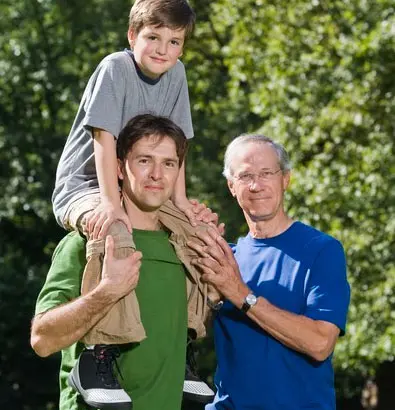by Sam Jones
Part of the How to Be a Better Dad series
Being a dad has many challenges and opportunities to learn and grow. When I had my first child, I was eager to be the best dad I could be and a better dad than my father. I was very fortunate because my dad lived with us and he provided well for our family; however, he was emotionally disengaged from us.
When I became a dad, my challenge was figuring out how to give my children something I never received from my father.
His emotional detachment followed me as I related to my daughter and son. Despite my good intentions, he was my role model for fatherhood. He was the “default” for what a father is and does.
For years I struggled to break away from that deeply ingrained behavior and learn to share genuine affection toward my children and spouse. My children felt my love, but they also felt my distance and coldness. It took God to free me and break the generational curse that controlled my life.
We all have to admit that none of our fathers were perfect. Even if you had an involved, committed, emotionally engaged father, he still had some shortcomings that you would be wise to identify and reconcile in your life—and possibly reconcile with him, if he’s available.
Below I have three steps to recommend that have been part of my growth and healing, but I want to be clear: this is rarely an easy process. Depending on your situation and how much you feel wounded by your father, healing may take many years, with help from trusted friends or a counselor, and possibly spiritual growth as part of the process.
Briefly, here are my suggestions:
Look at what your father received from his dad.
Later in life, I found out that emotional detachment was a generational curse. My grandfather didn’t show affection and affirmation to my father and his siblings, so that negative tendency was prevalent for at least three generations, maybe more.
Realizing that my father was also raised by a distant father, it was more difficult to blame him for what I didn’t receive from him. I found more understanding and grace for him, even as I appreciate more and more that I will need grace from my children.
Watch other dads around you.
Fortunately, I had men in my life who showed healthy affection toward their wives and children, and I watched them closely. Eventually, their example helped to offset what I had seen in my father, and the idea of fathers being emotionally attached to their children became normal and expected in my mind. And I gradually became more comfortable expressing positive emotions with my children. I became a better father and a father figure to many of my children’s friends who did not have fathers in their homes.
Help more men be better dads.
I later became involved in teaching other men about fatherhood. I initiated the first significant fatherhood program in Birmingham, Alabama, at the local university’s TASC program in 2003. Within three years, I had 325 fathers in classes each week at 17 different sites throughout the county. Then I became a master trainer for the National Center for Fathering and trained more than 100 men to be facilitators across the United States.
The saying is true: if you want to really learn something, teach it to someone else. Coaching other men about fatherhood helped me be a better father.
Whatever your past or present situation might be, you can grow as a father. You can overcome the past and win with your kids. One day at a time, you can change for the better. I certainly did.
Sam Jones is CEO of Families in Focus Christian Network and a Master Trainer for the National Center for Fathering, having trained men across the country to facilitate the Quenching the Father-Thirst program. Sam is also a world-class fencer and has competed in several veteran worlds fencing championships. Sam and his wife Francine have two adult children and live in Baton Rouge, LA.
Action Points & Discussion/Reflection Questions
- Look through some photos of you and your child when you first became a father. What do you wish you could go back and tell that guy to help him?
- List 3-5 ways you are LIKE your father and 3-5 ways you’re NOT LIKE him—anything from habits and preferences to character qualities or experiences. What new insights, if any, did this reveal about his influence on you?
- What was the emotional atmosphere of your home growing up? How would you describe it now, with your kids?
- In what other ways do you feel “wounded” or let down by your father?
- Project 15 or 20 years into the future. What do you imagine your children will say were the positives and negatives they received from you? Use that as motivation to commit to grow in ways that will minimize those negatives.
- What other men have helped to shape your ideas about healthy fatherhood? Reach out to them and express your appreciation—either now or on Father’s Day.
What insights do you have to share? How have you been able to overcome a painful past or reconcile with your father? Join the discussion on our Facebook page.
.



